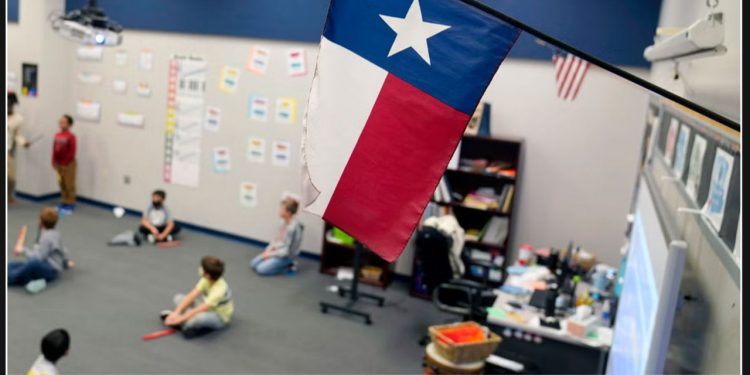Texas is on the verge of implementing changes that would permit the inclusion of Bible-infused lessons in elementary schools. This decision, which is up for a final vote on Friday, could potentially challenge the delicate balance between religion and public education in the United States.
The Texas State Board of Education has given a preliminary vote to the proposed curriculum, despite facing strong opposition and support. After listening to hours of passionate arguments from both sides, the elected members narrowly cleared the vote. If implemented, schools in Texas could start using this new curriculum from next year.
The proposed Texas curriculum would mirror the actions taken by Republican-led initiatives in nearby states to increase the presence of religion in public schools. Oklahoma’s education chief has mandated that a copy of the Bible in every classroom, while Louisiana intends to require the posting of the Ten Commandments in all public school classrooms starting next year.
Schools in Texas have the option to adopt the materials, although they would receive additional funding if they choose to do so.
According to Matthew Patrick Shaw, an assistant professor of public policy and education at Vanderbilt University, Texas would be breaking new ground by introducing Bible lessons in schools if the board moves forward with the curriculum changes.
The Texas Education Agency, responsible for the education of over 5 million students across the state, took the initiative to develop its own instructional materials. This decision came after a law was passed in 2023 by the GOP-controlled Legislature, mandating the agency to create these resources. As a result, the lesson plans were made available to the public during the spring season.
The proposed reading and language arts modules for kindergarten through fifth grade heavily rely on lessons from Christianity. Critics argue that this approach may alienate students from diverse faith backgrounds and possibly infringe upon the First Amendment.
According to Amanda Tyler, executive director of the Baptist Joint Committee for Religious Liberty, the curriculum fails to be age-appropriate or subject matter appropriate in its presentation of Bible stories.
According to her, young children are not able to distinguish between statements based on faith and those based on factual information.
Over 100 individuals passionately shared their testimonies at a recent board meeting. Among them were parents, teachers, and advocates, all expressing their deep emotions. Those in favor of the curriculum emphasized that the Bible holds significant importance in American history and believe that teaching it will greatly enhance students’ educational experience.
According to Mary Castle, the director of government relations for Texas Values, it is commonly believed that there are nearly 300 phrases used today that originate from the Bible. She explains that students can greatly benefit from understanding these references in literature, as it enables them to comprehend the meaning behind these phrases.
The board, which is made up of 11 Republicans and four Democrats, showed its support for the materials in a preliminary vote of 8-7 on Wednesday.
A recent addition to the board is a Republican member, who was appointed by Republican Gov. Greg Abbott to temporarily occupy a vacant seat. Shortly after this appointment, a Democrat, who had no opposition, was elected to take over the same board seat from next year onwards.
Abbott has openly expressed his support for the instruction materials.
Shaw said that the constitutionality of the lesson plans is uncertain if the curriculum is approved.
According to the expert, the key concern is how Texas will address the establishment question. They ponder whether Texas will try to avoid it altogether or confront it directly.
Texas is currently in the process of incorporating Biblical teachings into public school lesson plans, as part of an ongoing trend among Republican-controlled states to introduce religion into educational settings.
A federal judge recently blocked a law in Louisiana that aimed to have the Ten Commandments displayed in all public classrooms. In June, Republican Gov. Jeff Landry signed the bill into law, which led to a lawsuit filed by a group of Louisiana public school parents of various faiths.
In Oklahoma, the state’s top education official has made an attempt to include the Bible in lesson plans for students in fifth through twelfth grades. Recently, a lawsuit was filed by a group of teachers and parents aiming to halt the plan of the Republican state superintendent and his allocation of $3 million for the purchase of Bibles in public schools.


